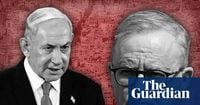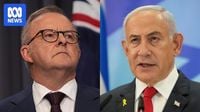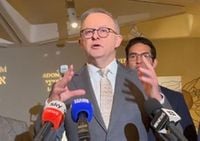Diplomatic tensions between Australia and Israel have reached a fever pitch this week, drawing public rebuke from the Executive Council of Australian Jewry (ECAJ)—the nation’s peak Jewish body. In an unprecedented move on August 20, 2025, the ECAJ sent simultaneous letters to both Australian Prime Minister Anthony Albanese and Israeli Prime Minister Benjamin Netanyahu, urging them to end what the group called a damaging "war of words" and return to the norms of international diplomacy.
The spat, which ECAJ President Daniel Aghion KC described as "dismaying and concerning," has left many in Australia’s Jewish community feeling exposed and anxious. According to ABC News, the ECAJ chastised Albanese for being "insulting" and Netanyahu for aiding antisemites through their recent public comments. The group warned that the leaders’ escalating rhetoric was not just a political spectacle, but one with real consequences for Jewish Australians, who now find themselves caught in the crossfire.
The roots of the crisis can be traced to August 11, when Prime Minister Albanese announced Australia’s intention to recognize a Palestinian state at the United Nations in September. The move triggered swift and sharp criticism from Israel, the United States, and segments of the Australian political spectrum. In a letter dated August 17, Netanyahu accused Albanese of "adding fuel on this antisemitic fire," a phrase he also reportedly used in correspondence with French President Emmanuel Macron, as reported by The Guardian.
Matters escalated further when, on August 18, Australia denied entry to Simcha Rothman, a far-right Israeli Knesset member known for controversial remarks about Palestinians. Rothman was scheduled to appear at several events in Sydney and Melbourne as part of what had been billed as a "solidarity tour." Home Affairs Minister Tony Burke explained the decision bluntly: "If you are coming to Australia to spread a message of hate and division, we don’t want you here." Israel responded immediately by revoking visas for Australian representatives to the Palestinian Authority—an act that Penny Wong, Australia’s Foreign Minister, called "an unjustified reaction" that undermined peace efforts and isolated Israel further.
The public exchanges between the two governments quickly devolved into personal attacks. On August 19, Netanyahu took to social media to label Albanese "a weak politician who betrayed Israel and abandoned Australia’s Jews." The statement, as reported by multiple outlets, was met with a mixture of anger and disbelief in Australia. Even Israel’s opposition leader, Yair Lapid, weighed in, calling Netanyahu’s remarks "a gift" to Australia and suggesting that such confrontations only serve to strengthen foreign leaders.
Albanese, for his part, attempted to de-escalate, telling reporters on August 20 that he did not take Netanyahu’s verbal assault personally and that he would continue to engage diplomatically. But not everyone in his government was so restrained. Tony Burke, the Home Affairs Minister, delivered a sharp rebuke on ABC Radio National: "Strength is not measured by how many people you can blow up or how many children you can leave hungry. Strength is much better measured by exactly what [Albanese] has done, which is when there’s a decision that we know Israel won’t like, he goes straight to Benjamin Netanyahu."
The ECAJ, alarmed by the spiraling rhetoric, stepped in to call for calm. In his letters, Daniel Aghion KC told Albanese that his July 30 remarks accusing Netanyahu of being "in denial" about the consequences of the Gaza war were "excessive and gratuitously insulting." Aghion also criticized Burke’s comments as "incendiary and irresponsible," warning that such language was especially dangerous coming from a senior minister responsible for social cohesion.
In his letter to Netanyahu, Aghion described the Israeli prime minister’s August 19 comments as "inflammatory and provocative," arguing they revealed "a woeful lack of understanding of social and political conditions in Australia." He reminded Netanyahu that no Jewish community in the world has a stronger or prouder record of support for Israel than Australia’s, a fact Netanyahu himself witnessed during his 2017 visit. The ECAJ cautioned that "the charge of antisemitism, whether made directly or indirectly, is a serious one and never to be made lightly," warning that careless use of the accusation only invites skepticism and undermines genuine efforts to combat antisemitism.
The diplomatic row has reverberated through both countries. In Australia, Labor MP Ed Husic has called for stronger sanctions against Israel, while Acting Foreign Minister Tim Ayres has urged restraint. The Opposition has signaled it would reverse recognition of Palestine if elected in 2028. Meanwhile, critics in Israel have accused Albanese of betraying a longstanding ally, and the Australian Jewish leadership has warned that the escalating rhetoric is feeding antisemitism at home.
Alex Ryvchin, co-chief executive of the ECAJ, criticized the decision to cancel Rothman’s visa but also called the subsequent responses by both governments "overblown." Speaking to Sky News, he said, "There are real-life consequences here and we want to see the countries work through any issues before things get out of hand." The ECAJ emphasized that the community would not be left to deal with the fallout of a spat between two leaders "playing to their respective domestic audiences," declaring, "This deterioration in the diplomatic relations between two countries we love is causing us nothing but pain and anguish, and we will not suffer in silence."
Internationally, the United States also weighed in, with its ambassador to Israel expressing disappointment over Australia’s decision to recognize Palestine. According to Nine Newspapers, the White House stopped short of direct criticism but made clear that U.S. recognition of a Palestinian state would not be forthcoming, characterizing such a move as a "reward for Hamas." Mike Huckabee, speaking on ABC’s 7.30 program, described the timing of Australia’s decision as "hurtful" and said there was "an enormous level of disappointment and some disgust."
The ECAJ’s intervention underscores the seriousness of the current crisis. The organization urged both governments to resolve their policy disagreements through normal diplomatic channels and to use language befitting national leaders if public comment was required. As the ECAJ put it, "the sum total of human wisdom would not have been diminished in the slightest if both leaders had opted for silence."
As the dust settles on a bruising week for Australia-Israel relations, the message from Australia’s Jewish leadership is clear: the community will not stand by as diplomatic tempers flare, and it expects better from those at the helm of both nations.



